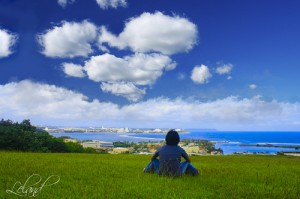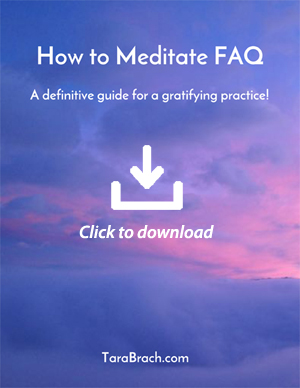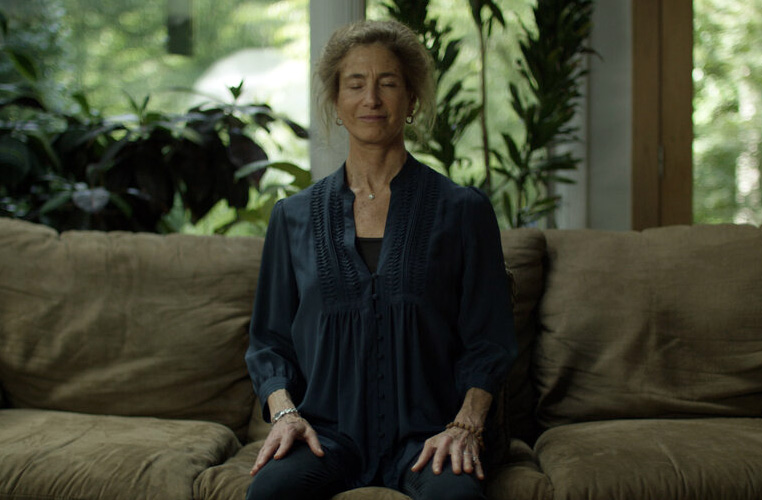Meditation students often ask me what will help them remember presence in the thick of things. My first response: “Just pause.” My second response: “Pause again, take a few conscious breaths, and relax.”
Our lives are constantly tumbling into the future, and the only way back to here and now is to stop doing and just be. Even a few moments of un-doing, of suspended activity, a mini-meditation of just being still, can reconnect you with a sense of aliveness and caring. That connection will deepen if, during those moments, you intentionally establish contact with your body, breathe, and relax.
A game I often play with myself is to see if I can spontaneously remember to pause in situations I usually charge right through. Washing the dishes. Walking from my office to the kitchen. Moving through e-mails. Eating popcorn.
Pausing is a wonderful and radical way of plucking myself out of virtual reality and discovering myself once again at the hub, awake, open, and here. A deliberate meditative pause helps us to savor the often-forgotten goodness and beauty that is within and around us.
One of my clients, Frances, experienced first-hand how the power of pausing and relaxing in the midst of all the doing in her life could actually change her experience of it. It began with the hurt and disappointment she felt when her two daughters chose to spend a holiday with their father (her ex-husband) rather than going on a trip with her.
“You’re no fun, Mom, you don’t know how to relax” one had said. When she protested, they pointed out that she was “all business” and was even grim about setting up vacation activities.
Frances recognized herself in their words. The oldest of five, she had prematurely become the caretaker of her siblings when her own mother had grown ill. “I don’t know how to play,” she confessed sadly. “I’m much more comfortable staying busy, getting things done.”
Shaken by what she felt to be her daughters’ rejection, Frances began a daily practice of meditation to learn how to relax. But when she met with me for guidance, her stiff posture and tightly knitted brows let me know that her approach to meditation was as grim as her approach to the rest of life.
I suggested that she find a beautiful place to walk and do some of her meditation practice there. Her assignment was still to wake up from thoughts when she became aware of them; but rather than the breath, her home base was all of her senses. She would become aware of the pressure of her feet on the earth, the images and smells and sounds of the natural world. I asked her to pause anytime something struck her as beautiful or interesting and to offer that experience her full attention.
When we met several months later, Frances gave me a meditation report: “Tara,” she said, “my walks are one long linger!” She went on to tell me about the pleasure she was finding in other parts of life—eating a peach slowly and savoring its texture and flavor, taking long hot showers, and increasingly, during sitting meditation, simply relaxing with the movement of her breath.
Most importantly, Frances was experiencing her daughters in a new way, appreciating one’s infectious laugh, the other’s grace. “I’m enjoying them,” she said smiling, “and they seem not to mind hanging out with me!” Frances was discovering the blessing of choosing presence—becoming intimate with the life that is right here, right now.
As Frances was discovering, all of our purposeful “doings” in meditation (naming our experience, mindfully scanning through the body, or focusing on the breath) can help us to pause and open ourselves to the life of the moment. Yet, because we can get so hooked by the need to do something more, we can help ourselves most deeply by our intention to let go.
For me, I sometimes remind myself of a line from poet Rainer Maria Rilke: Let everything happen to you: the beauty and the terror . . .Feel free to experiment with your own self-reminders. What word or phrase helps you to stop pedaling, to relax your habitual doingand simply be?
Hindu teacher Swami Satchidananda was once asked by a student if he needed to become a Hindu to go deeply into the practice of yoga. Satchidananda’s response was, “I am not a Hindu, I am an undo.” Just so, when meditation frees us, it does not turn us into something better or different, nor does it get us somewhere. Rather, meditation allows for an undoing of our controlling behavior, an undoing of limiting beliefs, an undoing of habitual physical tensing, an undoing of defensive armoring, and ultimately, an undoing of our identification with a small and threatened self.
By undoing all the doings, we discover the vast heart and awareness that is beyond any small-self identity; the heart and awareness that gives us refuge in the face of any life situation. This is the gift of meditation practice—we find we can trust who we most deeply are.
Adapted from Tara’s book, True Refuge – Finding Peace and Freedom in your Own Awakened Heart (Bantam, Feb, 2013)
For more information on Tara Brach go to: www.tarabrach.com


